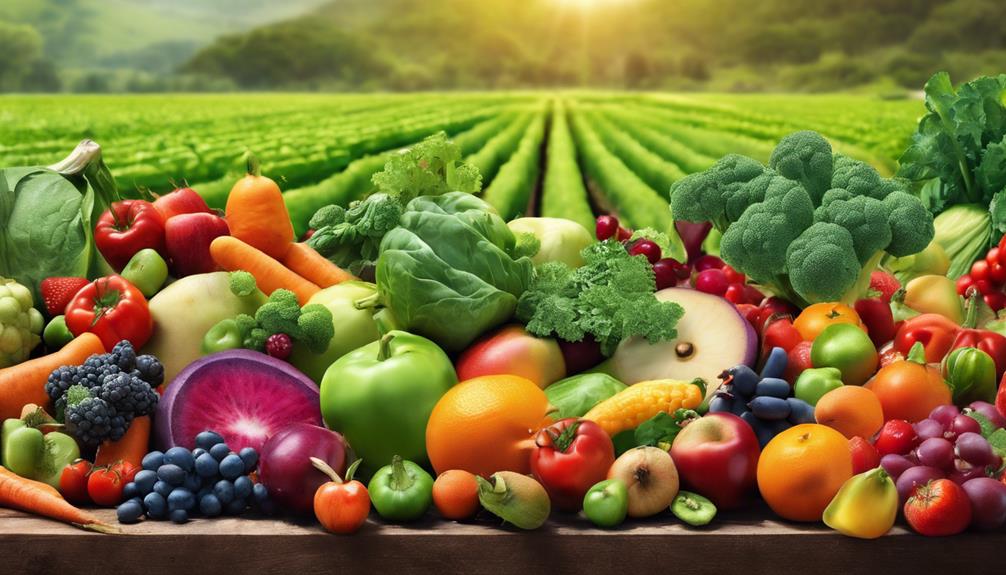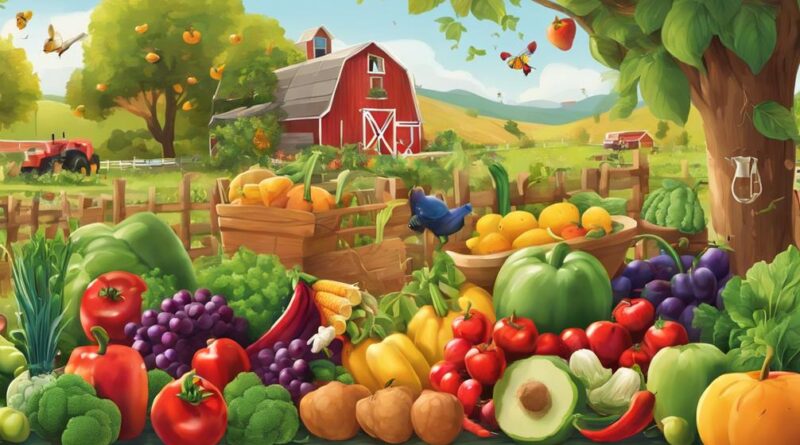5 Best Benefits of Farming Without Pesticides
Did you know that over 5 billion pounds of pesticides are used globally each year?
Farming without pesticides offers numerous benefits that you might not have considered. Healthier soil, cleaner water, and safer food are just a few advantages.
But there's one particular benefit that stands out above the rest, and it might surprise you.
Stay tuned to discover how farming without pesticides can lead to a more sustainable and resilient agricultural system.
Healthier Soil Ecosystem
By eliminating the use of pesticides, you can improve the health of your soil ecosystem. Pesticides not only kill harmful insects but also beneficial ones, disrupting the natural balance in the soil. Without pesticides, the soil can thrive, leading to improved fertility and increased biodiversity. When pesticides are used, they not only target the pests but also harm essential microorganisms that contribute to the soil's health. By avoiding pesticides, these microorganisms can flourish, enhancing the soil's ability to support plant growth.
Improved fertility is a significant benefit of farming without pesticides. Pesticides can strip the soil of essential nutrients and disrupt the natural processes that make the soil fertile. Without these chemicals, the soil can maintain its nutrient levels and support plant growth more effectively. Additionally, the presence of beneficial insects and microorganisms can help break down organic matter, releasing nutrients back into the soil and further enhancing its fertility.
Increased biodiversity is another advantage of pesticide-free farming. When pesticides are used, they can harm a wide range of organisms, not just the targeted pests. By eliminating pesticides, you allow for a diverse range of species to inhabit the soil, creating a healthier and more balanced ecosystem. This biodiversity can improve soil structure, nutrient cycling, and overall resilience to environmental stressors, ultimately leading to healthier and more productive soil for farming.
Reduced Water Contamination
Farming without pesticides can lead to a significant reduction in water contamination. When pesticides are used in farming, they can seep into the soil and eventually find their way into water sources through runoff, contaminating rivers, lakes, and groundwater. By opting for pesticide-free farming methods, you contribute to water conservation and help maintain a healthier ecosystem balance.
Without pesticides, there's less chemical runoff entering water bodies, which means reduced pollution and healthier aquatic environments. This shift not only benefits the water sources directly but also supports the organisms living in and around them. When water contamination decreases, the overall quality of water improves, making it safer for consumption and recreation.
Moreover, pesticide-free farming promotes ecosystem balance by preserving the natural interactions between organisms in the environment. When harmful chemicals are eliminated, beneficial insects, birds, and other wildlife crucial for maintaining a balanced ecosystem can thrive. This balance is vital for sustaining biodiversity and ensuring the long-term health of our environment.
Preservation of Biodiversity
Preserving biodiversity becomes a natural outcome of farming without pesticides as it allows for the thriving of various species essential for ecosystem health and balance. This method of farming promotes ecosystem balance and wildlife conservation by providing a safer environment for different species to coexist harmoniously.
Here are three key ways farming without pesticides contributes to the preservation of biodiversity:
- Protection of Natural Habitats: Without pesticides harming the environment, natural habitats can flourish, providing a safe space for diverse plant and animal species to thrive. This, in turn, helps in maintaining a balanced ecosystem where each species plays a vital role.
- Enhancement of Species Diversity: Farming without pesticides allows for the proliferation of various species, from insects to birds and mammals. This increased species diversity is crucial for maintaining a healthy ecosystem as each species contributes uniquely to the intricate web of life.
- Promotion of Wildlife Conservation: By eliminating harmful chemicals from the farming process, wildlife populations can rebound and flourish. This conservation of wildlife is essential for the long-term health of ecosystems and ensures the sustainability of our natural world for future generations.
Safer Food Consumption
Ensuring safer food consumption is a direct result of farming without pesticides, as it minimizes the risk of harmful chemical residues in the produce you eat. By opting for pesticide-free farming methods, you're choosing reduced toxins in your food, leading to improved health outcomes for you and your family.
When you consume food grown without pesticides, you're less exposed to harmful chemicals that can linger on fruits, vegetables, and grains. These chemicals, often designed to kill pests, can have adverse effects on human health when ingested. By avoiding these chemical residues, you reduce the potential risks associated with pesticide exposure, such as various illnesses and health complications.
Moreover, farming without pesticides promotes a more natural and holistic approach to agriculture. This method focuses on harnessing the power of nature to combat pests and diseases, rather than relying on synthetic chemicals. As a result, the food produced tends to be more nutritious and free from artificial substances that could compromise your well-being.
Protection of Pollinators
By farming without pesticides, you actively contribute to the protection of pollinators crucial for ecosystem biodiversity and food production. Pollinators, especially bees, play a vital role in the pollination of crops, ensuring the production of fruits, vegetables, and seeds. Here are three key ways in which pesticide-free farming supports the protection of pollinators:
- Preservation of Pollinator Habitat: Pesticides can harm the natural habitats of pollinators, making it challenging for them to thrive. By avoiding pesticides, farmers help maintain healthy environments for pollinators to live and forage, ultimately supporting their populations.
- Promotion of Bee Population: Bees, in particular, have been facing population declines due to pesticide exposure. Choosing pesticide-free farming practices can help safeguard bee populations, ensuring their presence for effective pollination of crops.
- Enhancement of Biodiversity: Protecting pollinators through pesticide-free farming contributes to overall ecosystem health and biodiversity. By allowing pollinators to flourish, farmers support the diversity of plant species and the stability of the entire ecosystem.
Enhanced Nutritional Value
To maximize the nutritional benefits of crops, farming without pesticides is a strategic choice that positively impacts the quality of the produce. When crops are grown without the use of pesticides, they tend to have increased levels of antioxidants. Antioxidants are important for your health as they help protect your cells from damage caused by free radicals. By consuming crops grown without pesticides, you're providing your body with a higher concentration of these beneficial compounds, which can contribute to better overall health.
Additionally, farming without pesticides can lead to an improved taste profile in fruits and vegetables. Pesticides can sometimes leave a residue on produce, affecting its flavor. When fruits and vegetables are grown organically, without the use of these chemicals, their natural flavors can shine through. This means that you get to enjoy the true taste of the produce as intended by nature, without any interference from potentially harmful substances.
Lower Risk of Residues

When you choose farming without pesticides, you significantly reduce the risk of residues remaining on your produce. This decision brings multiple benefits to both your health and the environment. Here's why it matters:
- Reduced environmental impact: By avoiding the use of pesticides, you contribute to preserving the health of ecosystems. Pesticides can harm beneficial insects, birds, and other wildlife, disrupting the delicate balance of nature. When you opt for pesticide-free farming, you help maintain biodiversity and promote a healthier environment for future generations.
- Improved crop quality: Farming without pesticides often leads to higher quality produce. Without the chemical interference, plants can develop stronger natural defenses, resulting in fruits and vegetables that are more robust and nutrient-rich. Additionally, the absence of pesticide residues can enhance the taste and overall nutritional value of the crops you harvest.
- Lower risk of health concerns: By consuming foods free from pesticide residues, you reduce the potential risks associated with these chemicals. Studies have shown that pesticide residues can accumulate in the body over time and may have adverse effects on human health. Choosing organic, pesticide-free produce can help you minimize these risks and support your well-being.
Support for Sustainable Agriculture
Choosing farming practices that prioritize sustainability is essential for ensuring the long-term health of our planet and food systems. By supporting sustainable agriculture, you not only contribute to environmental preservation but also reap benefits such as increased productivity and economic viability. Sustainable farming techniques, like crop rotation and integrated pest management, can enhance soil health and biodiversity, leading to higher yields over time.
When you invest in sustainable agriculture, you're investing in the future of our food supply. By avoiding the negative impacts of pesticides on soil and water quality, you help create a more resilient and robust agricultural system. This resilience translates into increased productivity as the soil remains fertile, reducing the need for costly fertilizers and pesticides in the long run.
Moreover, sustainable farming practices often lead to improved economic viability for farmers. By reducing input costs and promoting natural pest control mechanisms, farmers can achieve higher profit margins. Consumers are also increasingly willing to pay a premium for sustainably grown produce, creating additional revenue streams for farmers who embrace environmentally friendly practices.
Frequently Asked Questions
What Are the Potential Economic Benefits of Farming Without Pesticides?
When you farm without pesticides, you can experience cost savings and increased profits. Sustainable agriculture practices are becoming more popular due to market demand for pesticide-free produce.
How Does Farming Without Pesticides Impact the Local Community and Surrounding Environment?
When you farm without pesticides, you contribute to community health by reducing the risk of harmful chemical exposure. This approach also supports environmental sustainability by preserving biodiversity and protecting ecosystems.
Are There Any Challenges or Limitations to Implementing Pesticide-Free Farming Practices?
When it comes to pesticide-free farming, you might face challenges like pest control without chemicals or increased labor for manual weed removal. Limitations could include lower yields due to potential crop damage or higher production costs for organic alternatives.
Regulations on pesticide use can be strict, requiring compliance with organic farming standards. Despite the hurdles, many farmers find innovative solutions to navigate these challenges and successfully implement pesticide-free practices.
How Do Farmers Who Choose to Farm Without Pesticides Manage Pest Control Effectively?
To manage pests effectively without pesticides, farmers can use integrated pest management strategies.
By incorporating natural predators and beneficial insects, farmers can control pest populations organically.
This method involves closely monitoring pest levels, utilizing crop rotation, planting pest-resistant varieties, and maintaining proper soil health.
What Role Can Consumers Play in Supporting and Promoting Pesticide-Free Farming Practices?
To support pesticide-free farming, consumers can boost market demand by choosing organic products and spreading awareness through consumer education.
By making informed choices and advocating for sustainable practices, you influence the market to favor pesticide-free farming.
Your actions directly impact farmers' decisions and help create a more sustainable food system.
Embrace your power as a consumer to drive positive change in agriculture.
Conclusion
In conclusion, by choosing to farm without pesticides, you aren't only promoting a healthier environment but also safeguarding your health and the well-being of future generations.
The benefits of this sustainable farming practice extend beyond just the quality of the food you consume, impacting the entire ecosystem.
Make a positive impact by supporting pesticide-free farming and contributing to a more sustainable agricultural future.
